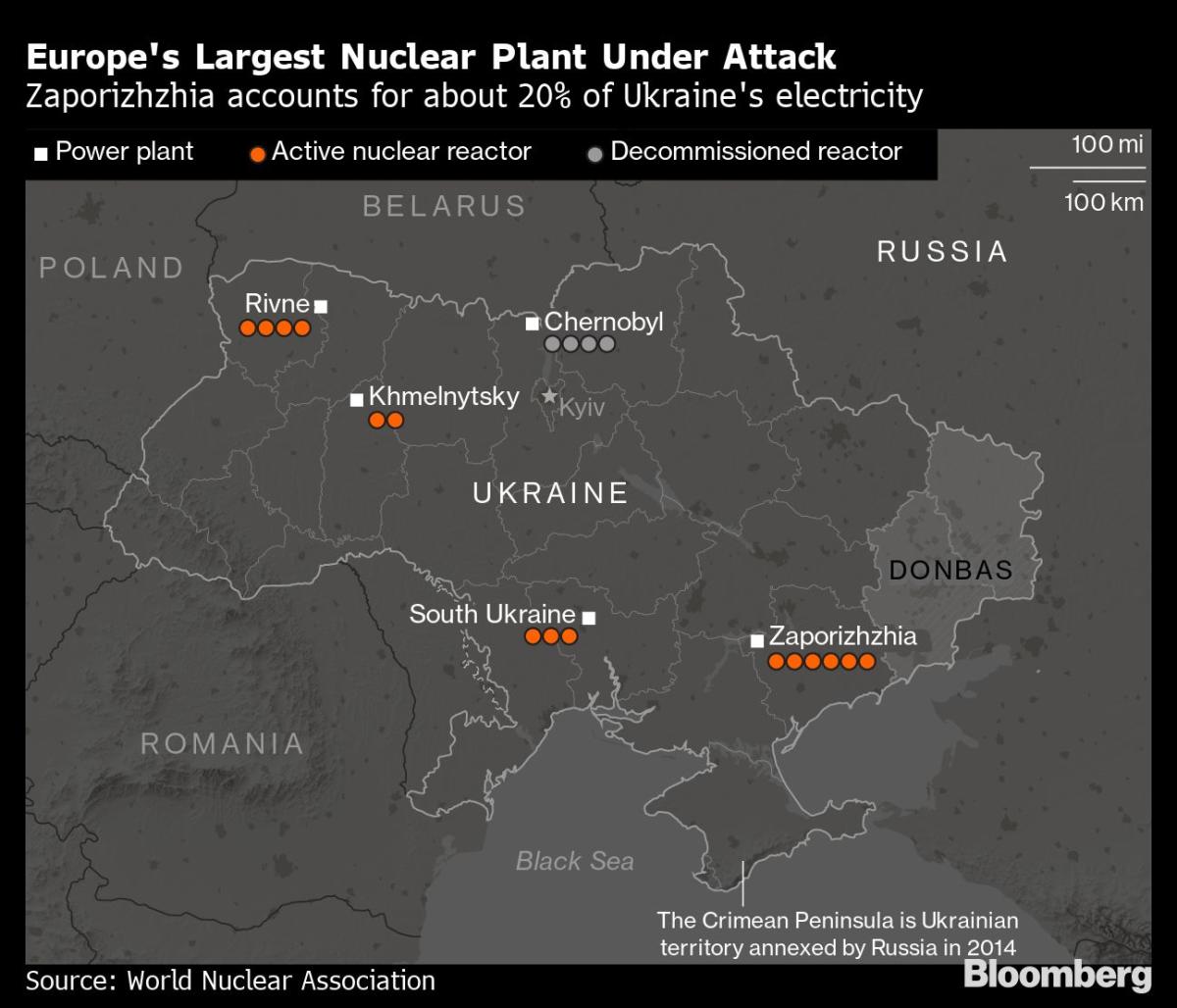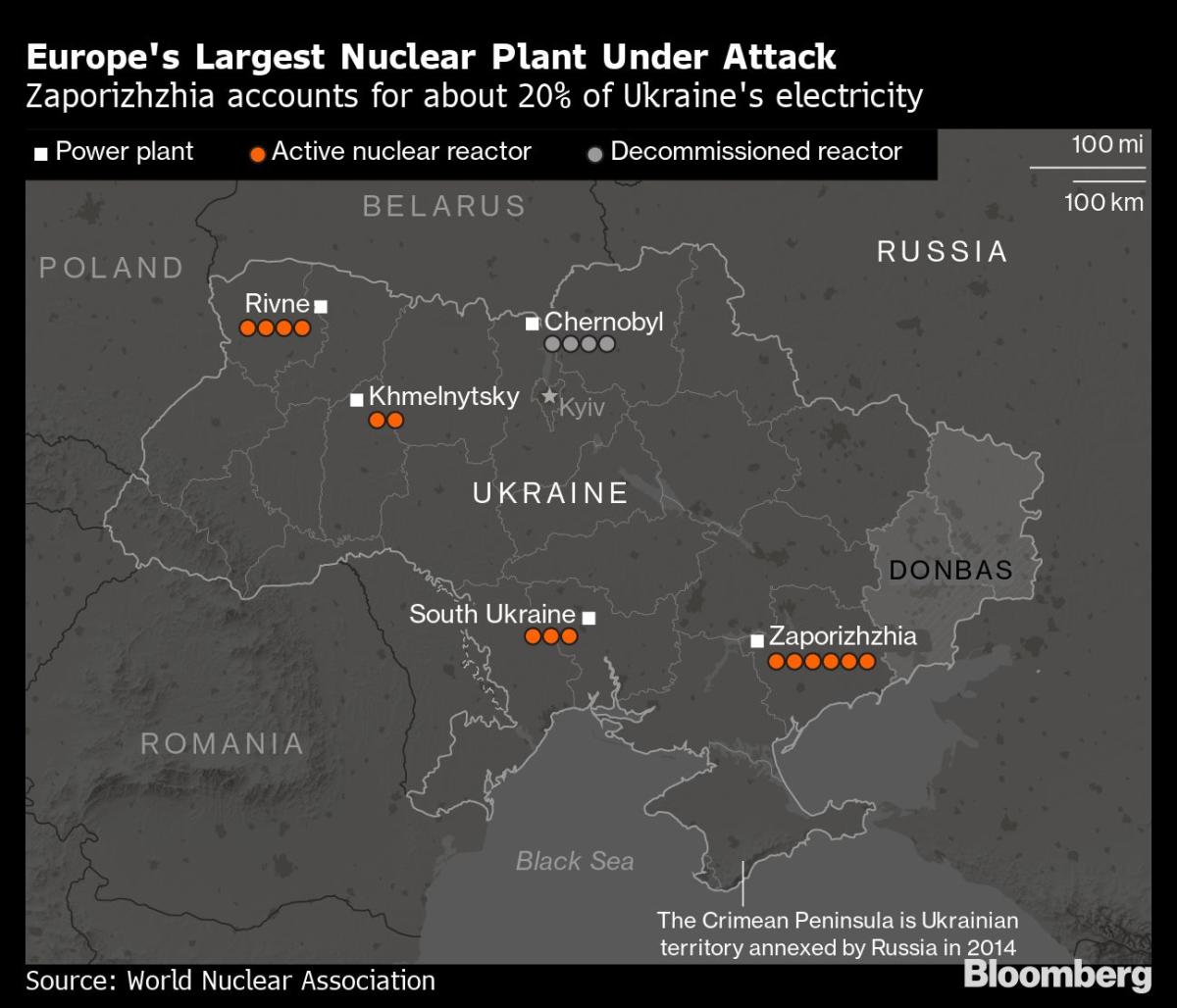
(Bloomberg) — United Nations monitors left Kyiv and are heading to the Russian-occupied Zaporizhzhia nuclear power plant to help evaluate the safety of one of the most-watched flashpoints of the war.
Most Read from Bloomberg
It’s the first visit by the International Atomic Energy Agency, the UN’s nuclear watchdog, since the facility was seized by Russian troops soon after they invaded in February, a move which prompted concern about a potential atomic disaster. Since July, shelling in the vicinity of the plant, which Russia and Ukraine blame on each other, has increased to become a near-daily occurrence.
European Union foreign ministers gathered in Prague sought to overcome divisions over demands to ban visas for Russian tourists, as they considered a compromise that would make it costlier and more difficult for Russians to travel to the bloc.
(See RSAN on the Bloomberg Terminal for the Russian Sanctions Dashboard.)
Key Developments
-
Why Ukraine’s Big Nuclear Plant Raises Worries Again: QuickTake
-
Europe Braces for Rationing Risks in Russian Gas Showdown
-
IAEA Team Leaves Kyiv to Inspect Nuclear Plant in War Zone
-
Mikhail Gorbachev, Soviet Leader Who Ended Cold War, Dies at 91
-
Ukraine Counterattacks in South, Leaves World Guessing on Scale
On the Ground
Russia hit Ukraine’s second-largest city of Kharkiv again overnight, the regional governor, Oleh Synyehubov, said on Telegram. According to preliminary information, two people were injured, he said. Fierce fighting continues around Bakhmut and Avdiivka in the eastern Donetsk region, Ukraine’s General Staff reported in its morning update on Facebook. In the Zaporizhzhia region in the south east, Russian units are regrouping with the aim of resuming their offensive, the report said. According to the UK’s latest intelligence update, Ukrainian forces have pushed the frontline back some distance in places, exploiting relatively thinly held Russian defenses.
(All times CET)
Gazprom’s Daily Gas Output Rises for First Time Since January (2:03 p.m.)
Gazprom PJSC’s daily natural gas production rose in August for the first time in seven months, rebounding from a multi-year low in July.
Russia’s biggest producer of the fuel pumped 829 million cubic of meters a day this month, up 7.1% from July, according to Bloomberg calculations based on preliminary data announced Wednesday by Chief Executive Officer Alexey Miller. Output so far this year reached 288.1 billion cubic meters, he said in an address published on the company’s Telegram channel.
European Gas Prices Slump as Rising Stocks Counter Risks (1:35 p.m.)
European natural gas erased earlier gains, with traders weighing risks to Russian supplies against the continent’s drastic efforts to curb the energy crisis.
Benchmark Dutch futures for October declined as much as 9.6%, with the market volatile amid thin trading and much uncertainty.
Ukraine Seeks to Sanction Russian Patriarch Kirill for 10 Years (1:30 p.m.)
The Ukrainian government called for imposing sanctions for ten years on Patriarch Kirill of the Russian Orthodox Church and other top Russian church officials. Kirill “justified the Russian invasion in Ukraine,” the cabinet said in a resolution that proposes a complete ban for all activities and involvement of Kirill and his subordinates in Ukraine.
The Ukrainian Orthodox Church gained independence from the Russian church in 2019, but some believers had deserted the Moscow-led organization before that, especially after the annexation of Crimea and the beginning of war in Donbas by Russia in 2014. After the invasion began, some local governments in Ukraine banned churches subordinated to the Russian Patriarchate, but the pro-Russian church still plays a significant role and has many parishes and monasteries.
EU Seeks to Resolve Split on Russian Tourists (12:20 p.m.)
European Union member states sought to overcome divisions over demands to ban visas for Russian tourists, as they considered a compromise that would make it costlier and more difficult for Russians to travel to the bloc.
As foreign ministers met for a second day of talks in Prague, the three Baltic states and Poland threatened unilateral action if the EU fails to agree to ban Russian tourists, but other envoys including from Germany and France have urged more caution. Ministers may settle on a compromise put forward by the Czech government, which currently holds the EU’s rotating presidency, to suspend a 2007 visa facilitation agreement with Russia.
Russian Crude Shipments to Asia Decline (11:45 a.m.)
Russia’s seaborne crude shipments to Asia have fallen by more than 500,000 barrels a day in the past three months, with flows to the region hitting their lowest levels since late March.
Shipments to Asia, where India stepped in to provide a market for crude shunned by European buyers after the invasion of Ukraine, have drifted lower since June. The region, which also includes Russia’s single biggest customer, China, is now the destination for about half of Russia’s seaborne crude exports, down from about 60% in April. Prior to the invasion, Asia received about a third of the shipments.
Germany ‘Probing Alleged Spying for Russia’ (11:30 a.m.)
Germany’s domestic intelligence agency is investigating whether two senior officials working on energy policy at the economy ministry were spying for Russia, Die Zeit newspaper reported, without identifying the source if its information.
While officials at the agency, which is responsible for counter-espionage, uncovered some suspect details which pointed to “an emotional attachment to Russia,” they have yet to find hard evidence of spying, the paper said. The economy ministry and the domestic intelligence agency declined to comment, it added.
German Unemployment Edges Higher on Refugees (10:10 a.m.)
German unemployment rose after more refugees from the war in Ukraine joined the workforce in Europe’s largest economy.
Joblessness rose by 28,000 in August, lifting the unemployment rate to 5.5%. Germany has registered close to a million people fleeing the fighting, though the actual number of those that have arrived and not returned remains unclear. A large majority is women, many traveling with children, according to the government.
Estonia Urges Tougher Sanctions on Russia (10 a.m.)
“We need to immediately ramp up the price of aggression to Putin’s regime,” Estonian Foreign Minister Urmas Reinsalu told reporters on the sidelines of a meeting with EU counterparts in Prague. He called for trade sanctions including on energy, more limits on individuals and entities, and a full shutdown of electronic banking.
Dutch Foreign Minister Wopke Hoekstra told reporters that his government remains “open to sanctions as long as we can do this together.” He added: “We have seen that this is something we managed to do very well particularly in the first half of the war.”
Taiwan Stocks Up on Weapons Helping Ukraine (10 a.m.)
Taiwan is stockpiling US-made weaponry that Ukraine has used to hold off Russia’s military, including Javelin anti-tank missiles and HIMARS long-range artillery, a sign Taipei is applying lessons from the conflict to deter China from following through on threats to take the island by force if necessary.
US and NATO officials have credited Javelins and other anti-armor systems as key to staving off a quick Russian victory in the early days of the war. Ukrainian forces have used the HIMARS artillery to hit Russian supply lines and ammunition stores behind the front with increasing effectiveness.
France Says It Can Get Through Winter (9:30 a.m.)
France said the nation’s gas storage will be full in about two weeks, enabling the country to ride out the winter even as Russia squeezes deliveries of the fuel. Europe’s energy crisis escalated when Gazprom PJSC said Tuesday it will halt supplies to French utility Engie SA because of a disagreement over payments.
“As we had expected, Russia is using gas as a weapon of war,” French Energy Transition Minister Agnes Pannier-Runacher said in a statement.
Baerbock Warns Against Unilateralism on Energy (9 a.m.)
German Foreign Minister Annalena Baerbock called for solidarity between EU countries as they come under pressure on energy issues.
Baerbock told reporters at a meeting of the bloc’s foreign ministers in Prague that “especially now with the energy question, it’s more important than ever” for countries to coordinate a response. “Some countries have made it clear that they’re not sure whether they can continue to export energy to other EU countries,” she added.
IAEA Mission En Route to Nuclear Plant (7:42 a.m.)
The IAEA mission plans to spend several days at the Zaporizhzhia plant, speak to the personnel and “see the real situation there and help stabilize the situation as far as it is possible,” Director General Mariano Grossi was quoted as saying by the Ukrinform news agency.
The agency intends to establish a permanent representative office at the plant, Europe’s biggest such facility, has become one of the most sensitive flash points of the war.
Most Read from Bloomberg Businessweek
©2022 Bloomberg L.P.




